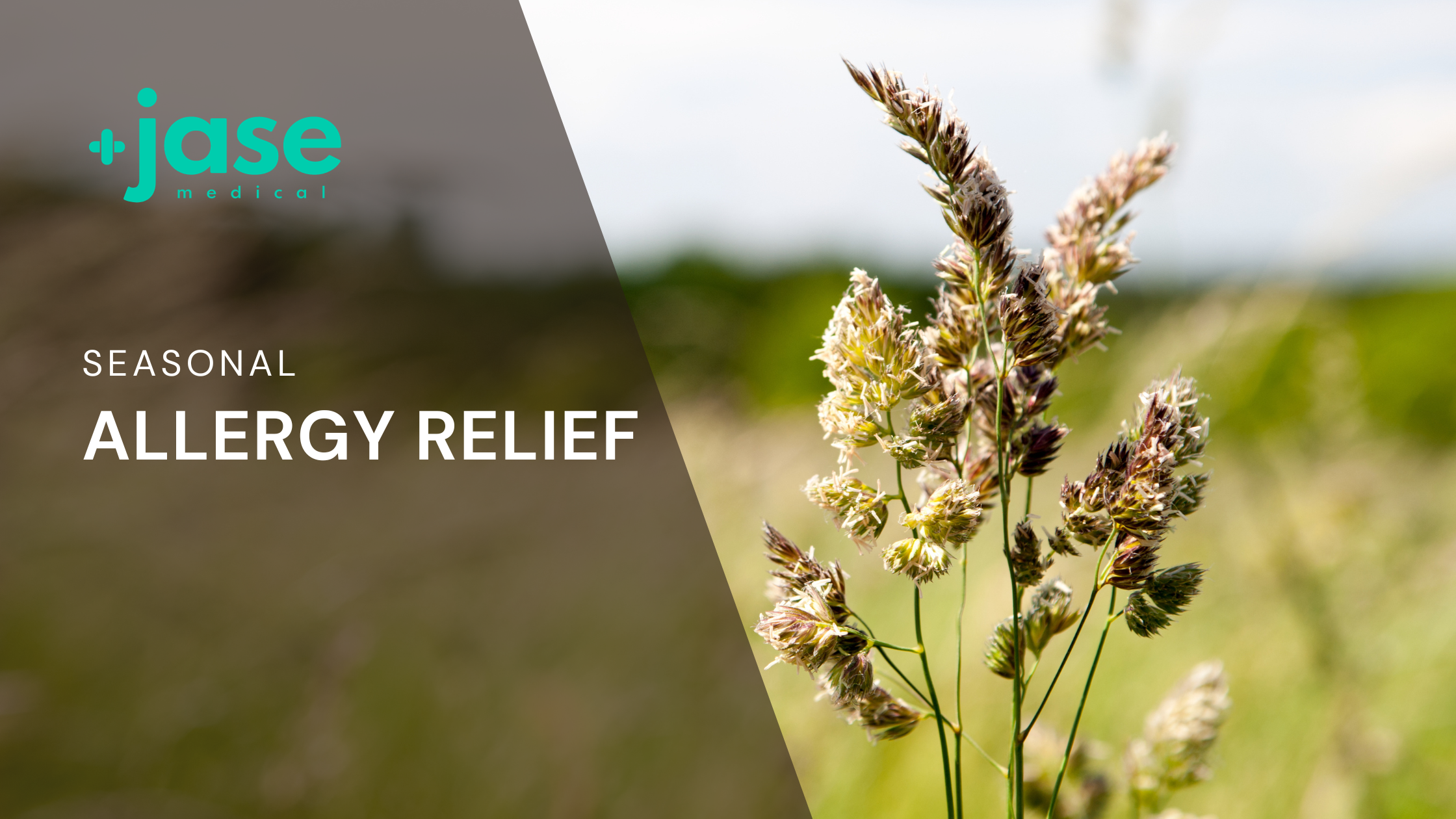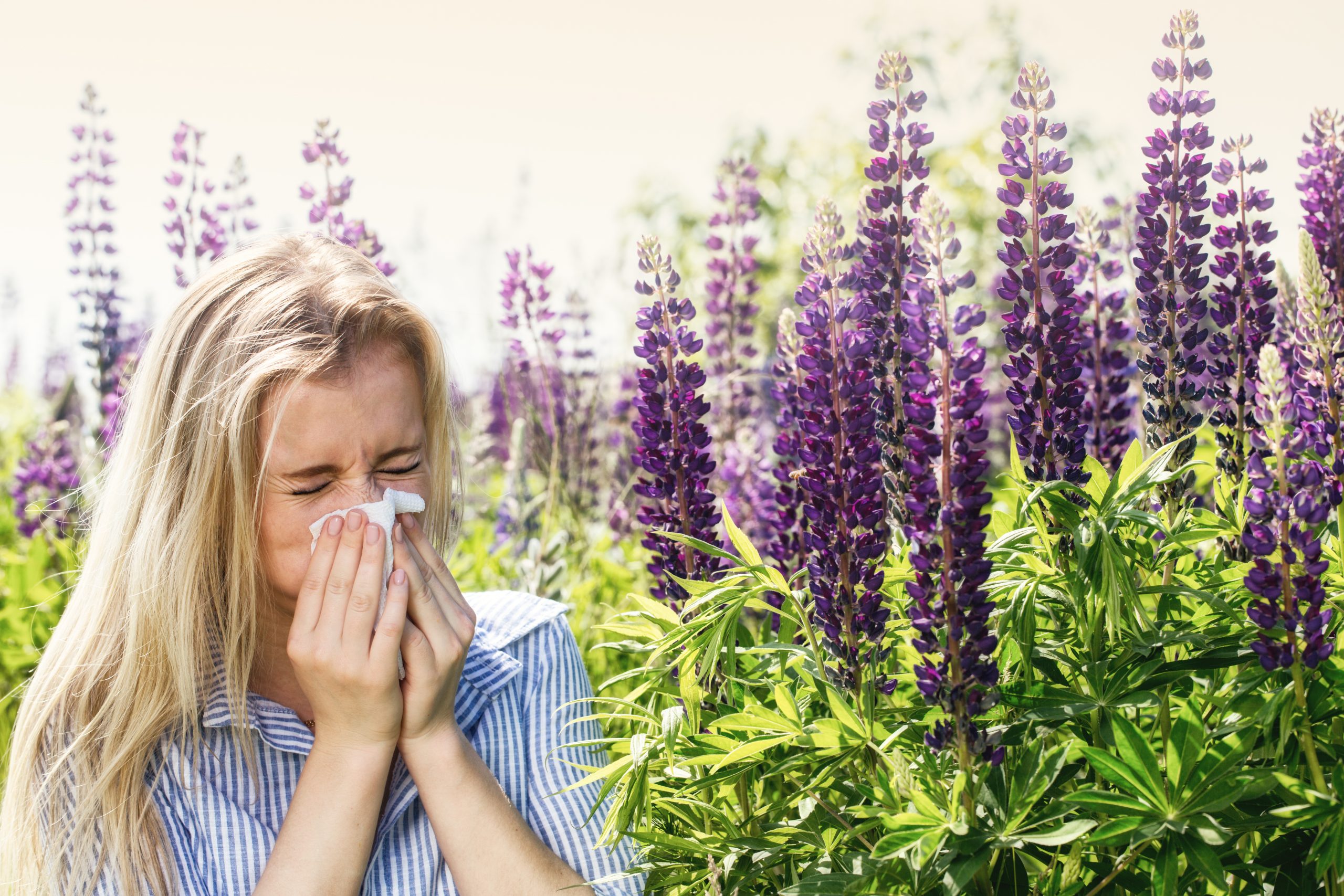If you’re considering Jase, chances are you’ve paused and thought, “This makes sense, but I still have a few questions.”You’re not alone. Here are the most common ones we hear, answered plainly. Is this really doctor-prescribed? Yes. Every Jase order is reviewed by a...
Seasonal Allergy Relief

As we emerge from the depths of winter and attention turns to the longer days that spring presents- more time outdoors, sports, gardening, outings to lakes and local parks can fill our leisure time.
Sunny days beckon us to spending more time outside, however many suffer from seasonal allergies. Seasonal allergies can make life perfectly miserable. Stuffy nose, swollen and teary eyes, clogged ears, sinus drainage, sneezing and cough add up to some allergy sufferers avoiding the benefits of being outdoors. In fact, seasonal allergies affect 19,2 million adults and 4.2 million children in the U.S.

What are seasonal allergies. And when ae they the most prevalent?
Seasonal allergies are also known as “hay fever” or seasonal allergic rhinitis. The immune system kicks into overdrive and overreacts to pollen or other substances. Symptoms happen during certain times of the year, when trees, grasses, and flowering plants release tiny pollen particles into the air to fertilize other plants.
Spring allergies begin in February and last until the early summer. However, seasonal allergies can happen anytime, depending on where you live and what your body overreacts to.
What are common seasonal allergy symptoms?
- Congestion
- Sneezing
- Itchy eyes, nose and throat
- Runny nose and eyes
- Puffy, swollen eyes
- Postnasal drip (drainage in the throat)
- Excessive sleepiness
- Coughing
- Brain fog
Some common seasonal allergens and when do they occur?
- Tree pollen—May, June, July
- Grass pollen—Depending on where you live – March through July
- Ragweed- sage, mugwort, rabbit brush, etc- end of August through October
- Mold—mostly in the fall, or in moist, warm environments and climates
How to control seasonal allergies
Environmental
Reduce your exposure to allergy triggers
- Stay indoors on windy days during pollen season.
- If the air in your home is humid, run a dehumidifier.
- Remove clothes you’ve worn outside and shower to rinse pollen from your skin and hair. This is especially important after mowing lawn or working in the garden
- Pollen can stick to sheets and towels, dry clothes inside.
- Wear a face mask when outside.
- Every city and area of the country has a pollen forecast. It can usually be found on weather apps on phone. In addition, your local tv or radio station may have pollen forecasts.
- Keep doors and windows closed when pollen counts are high
- Avoid outdoor activity in the early morning when pollen counts are highest.
- Keep indoor air clean- portable Hepa filter devices can clear a room of allergens. These are very useful in the bedroom. Keep the unit on, even when not in the room to help keep air clean.
- Use air conditioner in home, change filters on a regular basis
- Damp mop all hard floor surfaces, thoroughly vacuum carpet with a vacuum equipped with a HEPA filter
Nonprescription medications that may help
Check with your care provider before using any over the counter or alternative treatments for allergy relief. Some over the counter medicines shouldn’t be used with high blood pressure patients, and there are interactions with any drug, over the counter or not.
Oral decongestants. Oral decongestants such as pseudoephedrine (Sudafed) can provide temporary relief from nasal stuffiness. Some allergy medications combine an antihistamine with a decongestant. Examples include cetirizine-pseudoephedrine (Zyrtec-D 12 Hour), fexofenadine-pseudoephedrine (Allegra-D 12 Hour Allergy and Congestion) and loratadine-pseudoephedrine (Claritin-D). Talk to your health care provider about whether the use of a decongestant is good for treating your allergy symptoms.
Oral antihistamines
Some oral antihistamines list sleepiness as a side effect (diphenhydramine and Chlorpheniramine for example. Be sure to read labels and precautions.
Antihistamines can help relieve sneezing, itching, a stuffy or runny nose, and watery eyes. Examples of oral antihistamines include loratadine (Claritin, Alavert).cetirizine (Zyrtec Allergy), Diphenhydramine (Benadryl) fexofenadine (Allegra Allergy) Chlorpheniramine (Chlor-Trimeton)
Corticosteroid nasal sprays. These medications improve nasal symptoms. Examples include and triamcinolone (Nasacort Allergy 24 Hour). fluticasone propionate (Flonase Allergy Relief), budesonide (Rhinocort Allergy) and triamcinolone (Nasacort Allergy 24 Hour. These are not recommended for long term use without medical supervision.
Cromolyn sodium nasal spray (Nasachrom). decreases inflammation in the nose and reduces substances in the body that release that cause allergy symptoms.
Try some home relief remedies
Neti pot
Neti pots can rinse sinuses out, clearing allergens in nasal cavity. They have a proven track record to relieve allergy symptoms. Use saline solutions from ready made pouches or if you use water, only use distilled /sterile water. Do not use tap water, there have been rare cases of infections from bacteria or protozoa in tap water. It may be safe to drink because stomach acid will kill pathogenic bacteria, however sinuses don’t have that protection. Be sure to thoroughly clean and air dry neti pot after use.
Raw honey, royal honey, propolis
Raw honey has been proven to relieve seasonal allergy symptoms. Start honey before allergy season before allergy season starts. Do not use in children under a year old.
Natural antihistamines are found in:
- Stinging nettle,
- Butterbur, a marsh plant
- Quercetin, found in citrus fruits, grapes, apples and onions along with other fruits and vegetables
- Bromelain, found in pineapples
Probiotics
Probiotics have been studied and have shown to relieve allergy symptoms. L Casei is a probiotic demonstrated to relieve allergy symptoms, It is found in kefir, a cultured milk product and in a lesser extent yogurts(check labels). There are other probiotics that have been researched and have positive results, however there have been mixed results.
When home remedies aren’t enough, Seek help from your healthcare provider.
If you have bad seasonal allergies, speak with your health care provider if your seasonal allergies aren’t relieved by the above methods or your symptoms are bad. They may recommend skin tests or blood tests to find out what allergens trigger your symptoms. This will enable your care provider to target which treatments are likely to work best for you.
- Brooke Lounsbury, RN
Medical Content Writer
Lifesaving Medications
Recent Posts
Keeping you informed and safe.
FAQ: Our most commonly asked questions about Jase
Medical Readiness: What Really Kills First
When Disaster Strikes, It’s Not Hunger or Thirst That Takes the First Lives In every disaster zone, from hurricanes in the Caribbean to war zones in Ukraine, the pattern is the same. People worry about food and water, but it’s infection that kills first. A small wound...
Exploring Dr. William Makis’ Hybrid Orthomolecular Cancer Protocol: Focus on Ivermectin and Mebendazole/Fenbendazole
Exploring Dr. William Makis’ Hybrid Orthomolecular Cancer Protocol: Focus on Ivermectin and Mebendazole/Fenbendazole *Disclaimer: This article is for educational purposes and does not constitute medical advice. Always seek professional guidance.* In the evolving...



